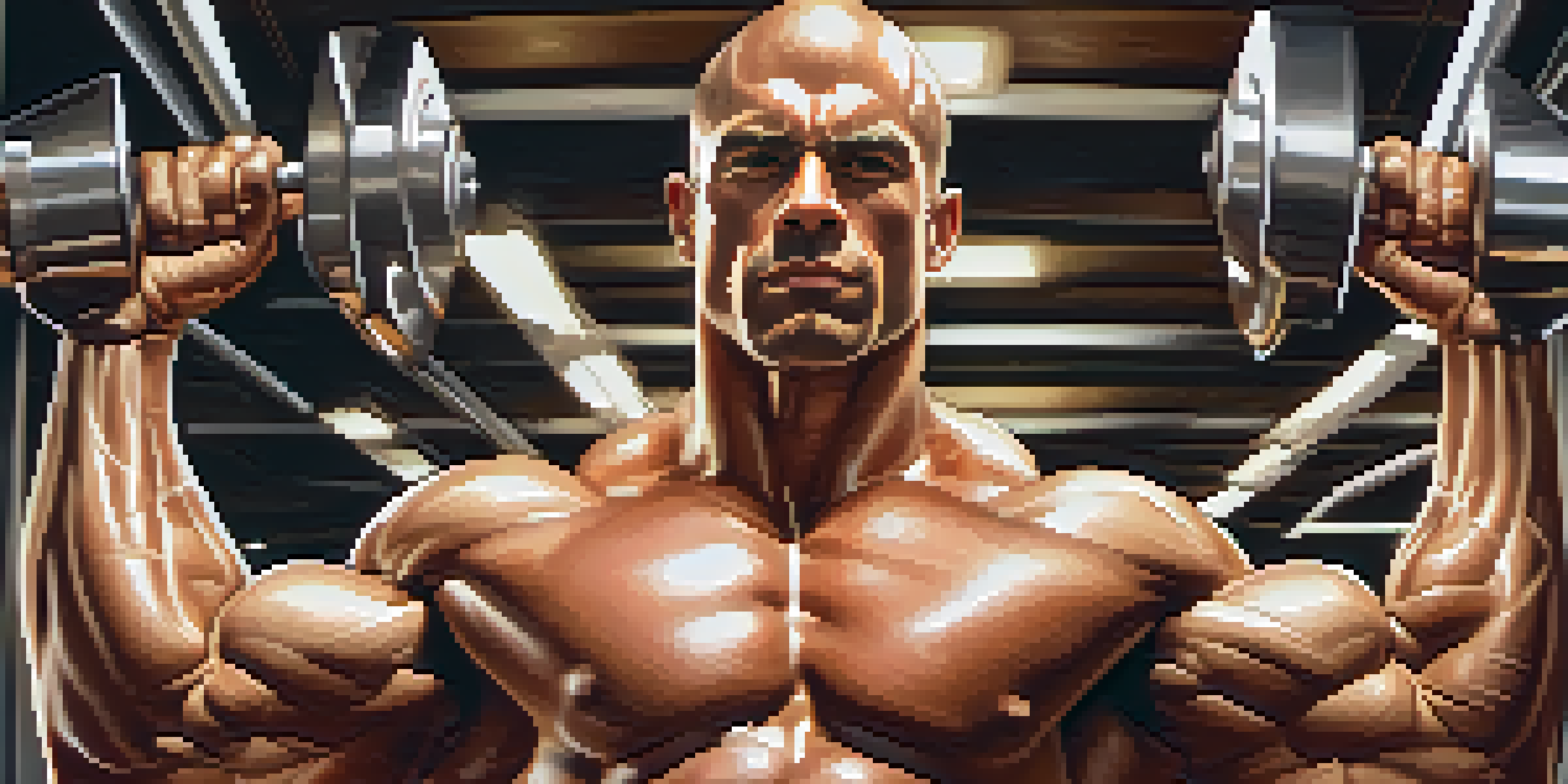How Hormonal Genetics Affect Muscle Growth in Bodybuilders

Understanding Hormones and Muscle Growth
Hormones are powerful chemical messengers that play a crucial role in muscle growth. They regulate various physiological processes, including metabolism, energy levels, and muscle repair. When it comes to bodybuilding, two key hormones are testosterone and growth hormone, both essential for building lean muscle mass.
Your genes are a blueprint for your body, but your environment can shape the way that blueprint is expressed.
Testosterone, often dubbed the 'king of hormones' in bodybuilding, helps increase muscle mass and strength. It promotes protein synthesis, the process where cells build proteins, leading to muscle growth. On the other hand, growth hormone aids in the recovery of muscles after intense workouts, ensuring bodybuilders can push their limits again and again.
By understanding how these hormones work, bodybuilders can tailor their training and nutrition to maximize the benefits. For instance, higher testosterone levels can enhance performance, making it vital for bodybuilders to recognize their hormonal profiles.
The Role of Genetics in Hormonal Production
Genetics plays a significant role in determining how much of these hormones are produced in the body. Some individuals are genetically predisposed to have higher testosterone levels, which can give them an advantage in bodybuilding. Others may have genetic variations that affect the sensitivity of their muscle cells to hormones, impacting their growth potential.

For example, if two bodybuilders follow the same workout regimen but one has a genetic predisposition for higher testosterone production, they may experience faster muscle gains than the other. This illustrates how genetics can create differences in bodybuilding outcomes, even with similar efforts.
Hormones Drive Muscle Growth
Testosterone and growth hormone are crucial for increasing muscle mass and aiding recovery in bodybuilders.
Understanding personal genetic backgrounds can help bodybuilders set realistic expectations. It allows them to recognize that while hard work is essential, genetic factors also play a crucial role in their success.
Hormonal Imbalances and Their Effects
Hormonal imbalances can significantly hinder muscle growth in bodybuilders. Conditions such as low testosterone levels can lead to fatigue, decreased muscle mass, and poor recovery. Identifying and addressing these imbalances is crucial for anyone serious about bodybuilding.
Nutrition is not just about eating, it’s about learning to live.
For instance, a bodybuilder experiencing chronic fatigue may not realize that low testosterone is the culprit. This imbalance can result in diminished workout performance and slower muscle recovery, making it challenging to achieve desired results.
Consulting with healthcare professionals to assess hormonal levels can provide insights. Once identified, targeted interventions such as lifestyle changes or medical treatments can help restore hormonal balance and improve muscle growth potential.
Nutrition's Impact on Hormonal Health
Nutrition plays a vital role in supporting hormonal health, which in turn affects muscle growth. Consuming a balanced diet rich in healthy fats, proteins, and carbohydrates can help maintain optimal hormone levels. For example, healthy fats found in avocados and nuts are crucial for testosterone production.
Bodybuilders should also pay attention to their caloric intake. Insufficient calories can signal the body to conserve energy, potentially leading to lower hormone production. This can stall muscle growth and recovery, making proper nutrition a key element in a bodybuilder's journey.
Genetics Influence Hormonal Levels
Genetic predispositions can lead to varying hormone levels, affecting individual bodybuilding success despite similar efforts.
Furthermore, certain foods are known to support hormonal health, such as leafy greens, lean meats, and whole grains. Incorporating these foods into a diet can help bodybuilders optimize their hormonal profiles for better muscle growth.
Training Methods Impacting Hormonal Responses
The way bodybuilders train can significantly influence their hormonal responses. High-intensity workouts, such as heavy lifting and compound movements, can boost testosterone and growth hormone levels. These workouts challenge the body, prompting it to adapt and grow stronger.
Conversely, overtraining can lead to diminished hormonal responses and increased cortisol levels, a stress hormone that can hinder recovery and muscle growth. It's essential for bodybuilders to find the right balance between pushing their limits and allowing for recovery.
Incorporating rest days and varying workout intensities can help maintain optimal hormonal levels. This strategy ensures that the body can recover and grow, ultimately supporting muscle growth.
The Psychological Aspect of Hormones and Bodybuilding
Hormones also influence psychological aspects that can affect bodybuilding performance. For instance, testosterone is linked to motivation and aggression, which can drive bodybuilders to push harder in the gym. Understanding this connection can help athletes harness their mental state to improve their training.
On the flip side, hormonal imbalances can lead to mood swings, anxiety, and depression, which can adversely affect motivation and performance. Bodybuilders experiencing these symptoms should consider evaluating their hormonal health to identify any underlying issues.
Nutrition Supports Hormonal Health
A balanced diet rich in healthy fats, proteins, and carbohydrates is essential for maintaining optimal hormone levels and promoting muscle growth.
Creating a supportive environment and focusing on mental well-being can enhance performance. This holistic approach ensures that bodybuilders not only focus on physical training but also prioritize their mental health, leading to better results.
Future Trends in Hormonal Research and Bodybuilding
As science continues to evolve, so does the understanding of hormonal genetics and their impact on bodybuilding. Researchers are exploring how genetic testing can help athletes tailor their training and nutrition to their unique hormonal profiles. This personalized approach could lead to more efficient muscle growth strategies.
New advancements in hormone therapy also show promise for individuals with imbalances. These therapies aim to restore hormone levels to enhance muscle growth and overall performance, allowing bodybuilders to reach their goals more effectively.

Staying informed about the latest research can empower bodybuilders to make educated decisions regarding their training and health. By embracing these advancements, they can take their bodybuilding journey to new heights.